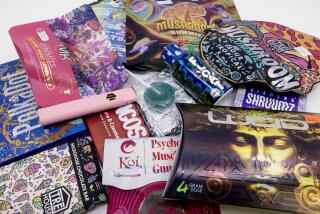Liver Transplants for 2 Who Ate Death Cup Mushrooms
- Share via
Two Oakland residents who dined on poisonous mushrooms after collecting the wild toadstools for a gourmet meal were hospitalized today at UCLA Medical Center for liver transplant operations, officials said.
Cynthia Zheng, 19, was in serious condition in the hospital’s intensive care ward after receiving a new liver Wednesday, a nursing supervisor said. Wilhelm Winter, 45, was in fair condition and awaiting a donor.
The two people, whose relationship was not immediately known, went to the Marin County coastal resort of Inverness last Friday and gathered a large number of mushrooms for a special dinner, said Dr. Robert Benjamin, Alameda County’s director of communicable disease control.
The two had eaten wild mushrooms before, Benjamin said, and were relying on a field guide that contained pictures of the Death cup mushroom, which is similar in appearance to grocery store mushrooms but can be fatal.
On Saturday morning, they awoke with classic symptoms of mushroom poisoning, including stomach pains, diarrhea, vomiting, cramps and nausea.
They were initially treated at Oakland’s Highland Hospital, where the second stage of the poisoning set in--paralysis, liver damage, delirium and coma. They then were transferred to UCLA Medical Center for liver transplants.
Benjamin said the case served as a good reminder for would-be mushroom hunters: Pictures in books are not enough.
In the early 1980s, Benjamin said, there was a rash of mushroom poisoning cases among youths seeking hallucinogenic mushrooms. In recent years the cases have tapered off but are on the increase again, primarily due to Southeast Asian immigrants who traditionally boil wild mushrooms to determine whether they are safe to eat.
Benjamin said while boiling and looking for water staining works with many poisonous mushrooms, that method is ineffective with the Death cup variety, known as Amanita phalloides.
More to Read
Sign up for Essential California
The most important California stories and recommendations in your inbox every morning.
You may occasionally receive promotional content from the Los Angeles Times.










